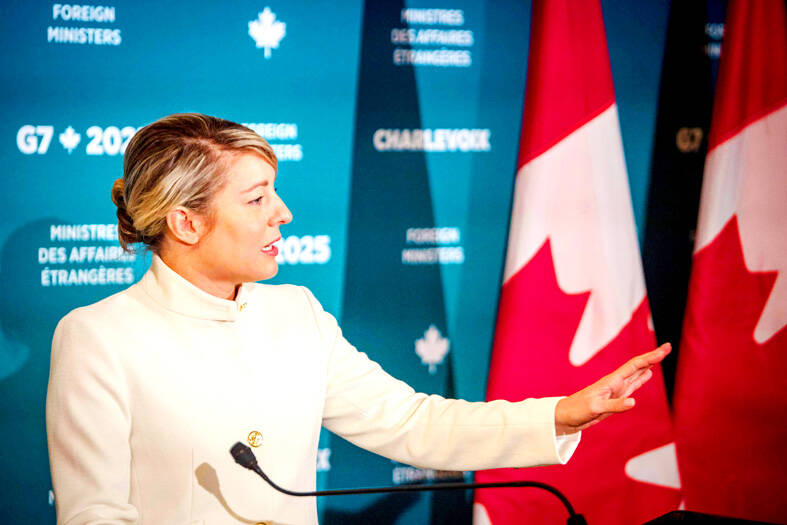Diplomats from the G7 nations yesterday reached a deal on a joint statement aimed at showing unity after weeks of tension between US allies and President Donald Trump over his upending of Western trade, security and Ukraine-related policy, three G7 officials said.
The statement, an all-encompassing document touching on geopolitical issues from across the world, still needed to get the green light from ministers before they wrapped up talks yesterday morning, the diplomats said.
The draft states G7 opposition to any unilateral attempts to change the status quo across the Taiwan Strait by force or coercion.

Photo: AFP
“I think we’re on track to have a strong statement. I’m confident that can be the case. It is normal in a G7 that there are negotiations until late in the night, and actually, I think ... political directors were really happy, because they went to bed earlier,” Canadian Minister of Foreign Affairs Melanie Joly told reporters.
The G7 ministers from Britain, Canada, France, Germany, Italy, Japan and the US, along with the EU, convened in the remote tourist town of La Malbaie, nestled in the Quebec hills, for meetings on Thursday and yesterday that in the past have been broadly consensual.
However, in the run-up to the first G7 meeting of Canada’s presidency, the crafting of an agreed final statement had been difficult with wrangling over the language regarding Ukraine, the Middle East and Washington’s desire for tougher wording on China.
G7 officials said that it was imperative to show Western unity, especially in light of efforts to get a ceasefire between Ukraine and Russia.
In the final draft, they removed a promise of security guarantees to ensure a truce, referring to “assurances,” but did warn Moscow to follow Kyiv in agreeing to a ceasefire or face further sanctions, including oil price caps.
“G7 members called for Russia to reciprocate by agreeing to a ceasefire on equal terms and implementing it fully,” the draft says.
“They emphasized that any ceasefire must be respected, and underscored the need for robust and credible security arrangements to ensure that Ukraine can deter and defend against any renewed acts of aggression,” the diplomats said in a reference to Ukraine’s territorial integrity.
Washington had sought to impose red lines on language around Ukraine to not harm its talks with Russia and opposed a separate declaration on curbing Moscow’s so-called shadow fleet, a murky shipping network that eludes sanctions, while demanding more robust language on China.
There had also been wrangling over language regarding Gaza and the Middle East, notably the notion of a two-state solution for the Israeli-Palestinian conflict, something the US was resisting.
The final draft made no mention of a two-state solution, dropping language that had stressed its importance in earlier drafts of the text.
“They underscored the imperative of a political horizon for the Palestinian people, achieved through a negotiated solution to the Israeli-Palestinian conflict that meets the legitimate needs and aspirations of both peoples and advances comprehensive Middle East peace, stability and prosperity,” the draft says.

CHAOS: Iranians took to the streets playing celebratory music after reports of Khamenei’s death on Saturday, while mourners also gathered in Tehran yesterday Iranian Supreme Leader Ayatollah Ali Khamenei was killed in a major attack on Iran launched by Israel and the US, throwing the future of the Islamic republic into doubt and raising the risk of regional instability. Iranian state television and the state-run IRNA news agency announced the 86-year-old’s death early yesterday. US President Donald Trump said it gave Iranians their “greatest chance” to “take back” their country. The announcements came after a joint US and Israeli aerial bombardment that targeted Iranian military and governmental sites. Trump said the “heavy and pinpoint bombing” would continue through the week or as long

TRUST: The KMT said it respected the US’ timing and considerations, and hoped it would continue to honor its commitments to helping Taiwan bolster its defenses and deterrence US President Donald Trump is delaying a multibillion-dollar arms sale to Taiwan to ensure his visit to Beijing is successful, a New York Times report said. The weapons sales package has stalled in the US Department of State, the report said, citing US officials it did not identify. The White House has told agencies not to push forward ahead of Trump’s meeting with Chinese President Xi Jinping (習近平), it said. The two last month held a phone call to discuss trade and geopolitical flashpoints ahead of the summit. Xi raised the Taiwan issue and urged the US to handle arms sales to

BIG SPENDERS: Foreign investors bought the most Taiwan equities since 2005, signaling confidence that an AI boom would continue to benefit chipmakers Taiwan Semiconductor Manufacturing Co’s (TSMC, 台積電) market capitalization swelled to US$2 trillion for the first time following a 4.25 percent rally in its American depositary receipts (ADR) overnight, putting the world’s biggest contract chipmaker sixth on the list of the world’s biggest companies by market capitalization, just behind Amazon.com Inc. The site CompaniesMarketcap.com ranked TSMC ahead of Saudi Aramco and Meta Platforms Inc. The Taiwanese company’s ADRs on Tuesday surged to US$385.75 on the New York Stock Exchange, as strong demand for artificial intelligence (AI) applications led to chip supply constraints and boost revenue growth to record-breaking levels. Each TSMC ADR represents

State-run CPC Corp, Taiwan (CPC, 台灣中油) yesterday said that it had confirmed on Saturday night with its liquefied natural gas (LNG) and crude oil suppliers that shipments are proceeding as scheduled and that domestic supplies remain unaffected. The CPC yesterday announced the gasoline and diesel prices will rise by NT$0.2 and NT$0.4 per liter, respectively, starting Monday, citing Middle East tensions and blizzards in the eastern United States. CPC also iterated it has been reducing the proportion of crude oil imports from the Middle East and diversifying its supply sources in the past few years in response to geopolitical risks, expanding